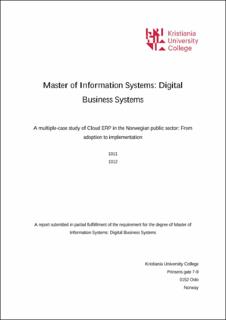| dc.description.abstract | Cloud computing (CC) technology has emerged as a favorable solution for organizations due to the urgent need for complex IT infrastructures. Hence, organizations across various sectors have moved their attention toward outsourcing computing platforms. Enterprise-resource planning (ERP) systems aid organizations in obtaining an understanding of business practices by allowing seamless integration of business accurate data for decision-making. Cloud ERP has the potential to deliver the same system functionalities as on-premise systems, at lower costs and effort. However, the uptake of such technologies has been reported as particularly low for public sector organizations (PSOs) when compared with private firms.
This study aims to explore factors influencing Norwegian PSOs intention to adopt cloud ERP, and which critical success factors are considered vital for a successful implementation. Furthermore, we illustrate the dynamic relationship between barriers at distinct phases. The research questions have been studied in a multiple case study, where the data has been collected through individual semi-structured interviews with Norwegian PSO representatives who either plan to adopt or have already implemented cloud ERP. The findings align with previous research regarding factors such as availability, reduced costs, updates, and maintenance. The findings also support that there is a link between organizational size and the desire to adopt. Contradictory, the findings reveal previously reported barriers such as security, vendor lock-in, lack of customization, and data ownership not to be perceived as direct barriers. Accordingly, our findings indicate more willingness among Norwegian PSOs to embrace cloud ERP than previously reported.
In the implementation stage, the findings closely resemble previous research. Factors such as user training, vendor selection, system integrations, and functionality are considered critical success factors among the Norwegian PSOs. One contradiction was discovered regarding project management, as the findings indicate that PSOs put more emphasis on a project team, rather than project management in isolation. Lastly, the results add to current research by identifying the dynamic interrelationship between barriers within distinct phases. Our findings suggest that open lines of communication amongst all parties involved are crucial throughout the entire process. The establishment of a solid contract is also considered vital. | en_US |

